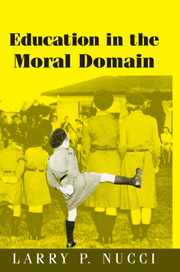Book contents
- Frontmatter
- Contents
- Foreword by Elliot Turiel
- Acknowledgments
- Introduction
- PART ONE THE NATURE OF MORALITY AND THE DEVELOPMENT OF SOCIAL VALUES
- 1 Morality and Domains of Social Knowledge
- 2 Morality and Religious Rules
- 3 Morality and the Personal Domain
- 4 Morality in Context: Issues of Development
- 5 Morality in Context: Issues of Culture
- 6 Morality and Emotion
- 7 Reconceptualizing Moral Character
- PART TWO CLASSROOM APPLICATIONS
- Conclusion: Keeping Things in Perspective
- Additional Resources
- References
- Index of Names
- Index of Subjects
4 - Morality in Context: Issues of Development
Published online by Cambridge University Press: 12 November 2009
- Frontmatter
- Contents
- Foreword by Elliot Turiel
- Acknowledgments
- Introduction
- PART ONE THE NATURE OF MORALITY AND THE DEVELOPMENT OF SOCIAL VALUES
- 1 Morality and Domains of Social Knowledge
- 2 Morality and Religious Rules
- 3 Morality and the Personal Domain
- 4 Morality in Context: Issues of Development
- 5 Morality in Context: Issues of Culture
- 6 Morality and Emotion
- 7 Reconceptualizing Moral Character
- PART TWO CLASSROOM APPLICATIONS
- Conclusion: Keeping Things in Perspective
- Additional Resources
- References
- Index of Names
- Index of Subjects
Summary
In the preceding chapters we reviewed the three main conceptual frameworks or domains in which people structure their ways of thinking about social values. The existence of distinct knowledge systems does not, however, preclude their conjoining or interaction in context (Piaget 1980, 1985). On the contrary, we often make use of knowledge from more than one conceptual system when dealing with issues in the context of everyday events. For example, deciding the best way to divide ten dollars among four people is simultaneously a moral problem, involving the fair distribution of goods, and a mathematical problem, entailing the calculation of proportions, fractions, and sums. Few ethicists or mathematicians would reduce these areas of knowledge to one another. Yet, in this example, we see an instance where mathematics and morality are interwoven, and where an adequate resolution of the problem requires coordination of knowledge from both domains.
Similar situations arise with regard to the three domains of social knowledge discussed in this book. Such overlap is inevitable given that all social interactions take place within societal systems framed by conventions. Thus, although many everyday issues are straightforward instances of either morality, convention, or personal choice, many others contain aspects from more than one domain. In such cases, people may differ from one another in terms of the information they may bring to a situation, the weight they may give to one or another feature of a given issue, and their level of development within each relevant conceptual domain.
- Type
- Chapter
- Information
- Education in the Moral Domain , pp. 76 - 93Publisher: Cambridge University PressPrint publication year: 2001
- 1
- Cited by



